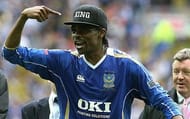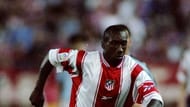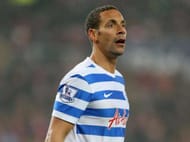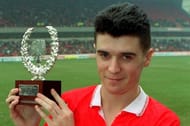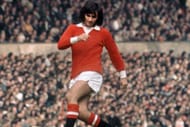We like to think relegation is only reserved for those teams that aren’t good enough, but there have been some examples to the contrary in recent times. Not only is a demotion to the lower leagues the result of poor performance but also a dangerous tool in the hands of football associations. Step out of line far enough and bam! you're in the second division, or in the third and so on.
Considering how relegation is seen as a sign of failure, it's absolutely astonishing how many greats of the sport have suffered the embarrassment. While some of these incidents are common knowledge, some are less well known. Here’s a quick look at 10 great football players who were relegated:
#10 Nwankwo Kanu
Nwankwo Kanu signed with Ajax as a teenager in 1994 at a time when very few African players would find their way to the European elite of football. Even though he was the oldest looking 19-year-old anyone had ever seen, he won three consecutive Eredivisie titles with the Dutch club and a Champions League medal in 1995 when he came on as a substitute against AC Milan in the final.
However, he was faced with the prospect of never playing again right after when he was found to have a heart defect during his medicals with Inter Milan. After surgery and two years later, he appeared for Inter but failed to make any impact which is when he moved to England as Arsene Wenger’s latest signing in 1999.
Even though he was mercilessly ridiculed for looking much older than he claimed, he tasted success with the Gunners yet again. He was the north London side’s super sub who amassed two league titles and two FA Cup victories between 2001 and 2004. Even though he faced less game time thanks to a certain Thierry Henry, he endeared himself to Arsenal fans forever when he scored a 15-minute hat-trick against Chelsea to help his side win 3-2.
Following his departure from London, he moved to West Bromwich Albion followed by a spell at Portsmouth under manager Harry Redknapp. He quickly became a fan-favourite there earning the nickname ‘King Kanu’ as he helped his team to an FA Cup in 2008 but that’s where the fairytale ended. Portsmouth faced relegation in the midst of major financial crises and thus came the end of a very successful career. After numerous trophies and two African Footballer of the Year awards, Kanu retired from club football as a result of relegation.
#9 Jimmy Floyd Hasselbaink
Born in Suriname, Dutch forward Jimmy Floyd Hasselbaink first came to notice when he signed for Leeds United in late 1997. It wasn’t long before he made a name for himself in England when he was awarded the Golden Boot in 1998-99. He ended up scoring 34 goals in 69 appearances during that time with the Yorkshire side. His successful spell was followed by a move to Atletico Madrid in Spain for a fee of £10 million in 1999.
It was in the Spanish capital where Hasselbaink faced the toughest test of his career. Even though he would go back to England and join Chelsea in 2000 and win his second Golden Boot after scoring 23 goals in 2000-01, it wasn’t before he faced much embarrassment in Atletico. The forward’s time in Spain started off on the right track under manager Claudio Ranieri. He scored a brace in the Madrid derby beating the Los Blancos at the Bernabeu for the first time in almost a decade and scored against Barcelona at the Camp Nou too.
However, despite Ranieri’s best efforts, the club’s performance was poor and the Italian resigned. Even though the club would qualify for the Cop del Rey final under replacement manager Radomir Antic, they were also relegated to the Segunda Division in Spain the same year. A clause in his contract allowed Hasselbaink to leave after the club’s failure to remain in the top flight as he signed for Chelsea and the rest, as they say, is history.
He was the club’s top scorer for three out of the four years he was there. He also reached the final of an FA Cup and reached his highest league finish of second place in 2003-04. He almost ended up at Barcelona thereafter but the dismissal of Louis van Gaal meant he had to do with moving to Middlesbrough, Charlton Atheltic and finally Cardiff City.
#8 Franco Baresi
One of the greatest captains and defenders of all time, Franco Baresi was a one-club man like no other. Selected by AC Milan at the age of 14, the Italian defender would go on to play out the rest of his career with the Rossoneri for 20 years. Not only is he one of the club’s most significant sweepers, he also captained the side for 15 years through superlative success in the 1980s and much of the 90s.
Nicknamed ‘Piscinin’ which is Milanese for ‘Little One’ owing to his short stature, Baresi was a sweeper in the same vein as Frank Beckenbauer from a generation before. In fact, his style was so similar to the German international, he was actually given the moniker ‘Kaiser Franz’. During his long tenure with the Milan side, Baresi won six Serie A titles, three Champions League titles, four Italian Super Cups, three European Super Cups and two Intercontinental Cups.
He didn’t just taste success with AC Milan of course. Baresi was part of the Italian World Cup-winning squad in 1982, managed a third place finish in 1990 and a runners-up spot in 1994. However, despite winning such honours, the Italian legend was faced with relegation in 1980 when AC Milan was implicated in a match-fixing scandal. The defender had the option of leaving then but chose to stay playing in Serie B the following season.
The Rossoneri were relegated again just a year later when they came third-last in 1981-82 but Baresi refused to part with his club yet again. By the time he retired in 1997, the AC Milan captain had achieved such cult status that the club retired the number 6 jersey in his honour.
#7 Joe Cole and Michael Carrick
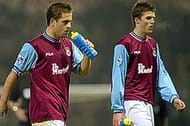
If I were to tell you West Ham United were relegated in 2003, it probably wouldn’t come as a surprise. After all, they are dangerously close to the drop zone right at this very moment in the Premier League. What comes as a surprise though is the players who went down with the club. Believe it or not but Joe Cole, Michael Carrick, David James, Jermain Defoe, Glen Johnson and Paolo Di Canio were all part of the side that suffered bitter humiliation when their side proved to be sub-par for the first division in England.
Back in 2001-02, the Hammers had finished seventh in the league but the following season proved to be a lot more challenging. 2002-03 was an abysmal year for the west London side as they won only three out of their first 24 fixtures and were at the bottom of the table with 16 points. When manager Glenn Roeder lost consciousness during a match against Middlesbrough, their poor form came into perspective.
Roeder was diagnosed with a non-malignant tumour and Sir Trevor Booking was appointed as caretaker manager. Even though their form improved thereafter they couldn’t avoid the drop and remained in the Championship for the next two seasons. It wasn’t until Alan Pardew took over that the Hammers were restored to the first tier in 2006-07.
It’s important to remember that the likes of Cole, James, Johnson, Carrick, etc. would all go on to represent England. Not only did they become capped players for their country, but the future stars of the sport amassed six FA Cups, 10 league titles and a Champions League trophy among them in the years to come.
#6 Rio Ferdinand
Manchester United and England defender Rio Ferdinand had a long and illustrious career barring that one drugs test he failed. Getting a start in the West Ham youth academy, the centre-half progressed to the senior team before moving to Leeds United for a record fee of £18 million in 2000. While immediate success eluded him there, he rose to the position of captain where he caught the eye of Sir Alex Ferguson.
The Manchester United boss gave him his first taste of success when he won the league with his new club in his very first season. Ferdinand had really impressed Ferguson who paid a record £29.1 million in 2002 for his services. His time at Old Trafford was laden with silverware as he became a permanent fixture in the heart of United's defence. Even though he missed the Red Devils' FA Cup victory in 2003 due to his ban from a failed drugs test, he bounced back to be named in the PFA Team of the Year four times in five years.
Thereafter, he went on to win five more Premier League titles, the Champions League, a FIFA Club World Cup and the FA Community Shield a number of times. He was also named in the FIFPro World XI in 2007-08. In his 12 years at the club, he came to be known for his fluid defensive style and represented England thrice in the FIFA World Cup. However, his tenure with United ended in 2014 when his contract expired and he moved to the newly promoted Queens Park Rangers.
After his first season where he made just 12 appearances, QPR suffered relegation and Ferdinand with them. However, the England centre-half was released from his contract which was when he decided to retire from football as well.
#5 Roy Keane
Another Manchester United legend, Roy Keane was an irreplaceable figure in the midfield for Sir Alex Ferguson. His aggressive and competitive style of play made him highly effective as he served as captain from 1997 to 2005. While many now remember him for his difficult nature, he helped United sustain a long period of success in his 12-year tenure. While his victories have been many, it’s hard to believe that this same man was turned down by many youth academies in Ireland and England.
As he grew older, the best he could do was a semi-professional club called the Cobh Ramblers. He moved to Nottingham Forest as a 19-year-old in 1990 and stayed there for three years before he made his big move to Manchester United in 1993. He made his way into the first team when a series of injuries kept Bryan Robson sidelined for much of 1993 and won his first double in 1993-94.
Keane also saw his side pass through a great transition when the likes of Mark Hughes, Paul Ince and Andrei Kanchelskis left to be replaced by the Class of ‘92. The Irish international finally departed Ferguson’s side in 2005 but not before he had won seven Premier League titles, four FA Cups and one Champions League. He was also named in the PFA Team of the Year five times.
However, before Keane reached such heights of greatness, he overcame the huge stumbling block of being relegated. In his final year with Nottingham in 1992-93, the club was demoted but not before Ferguson rescued him with a contract offer. After all, he had been named in the PFA Team of the Year in spite of his side’s horrendous performance.
#4 Michael Owen
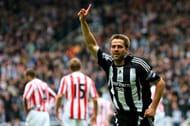
A childhood Everton fan, Michael Owen would grow up to be a legend for the red side of Liverpool whom he joined at the age of 12. By the age of 17, he had signed his first professional contract with the senior team and wasted no time to show his worth as he scored on his debut against Wimbledon. The English striker made a name for himself for his quickness and vision as there was quite no one like him playing in England at that time.
In 1997-98 when he replaced Robbie Fowler as the side’s first-choice striker. He made his presence felt immediately winning both the Golden Boot and PFA Young Player of the Year. Even though the later part of the 90s was riddled with injuries for the forward, he managed to win the Golden Boot a second time.
2000-01 was, as we all remember, a landmark year for Owen when Liverpool won the FA Cup, League Cup and the Champions League. That wasn’t all. He was awarded the Ballon D’Or in 2001 ahead of the likes of Oliver Kahn, Raul and David Beckham.
His exploits in England earned him a contract with Real Madrid in 2004 but Owen had already begun to slow down and mainly appeared as a substitute for the Los Blancos. After just a year of playing alongside the Galacticos, Owen moved to Newcastle United where he tasted the bitter result of relegation in his last season at the club. In his four years with the Magpies, he spent a large part of the time sidelined due to injuries.
Luckily for Owen, when Newcastle was relegated from the first division after 15 years in 2009, his contract expired meaning he would not have to play in the Championship. Despite the club’s many efforts, Owen waited for his contract to run out in the hope any number of clubs would be interested in signing a free agent and that club turned out to be Manchester United.
#3 George Best
George Best was an oddity for his generation. At a time when English football was primarily about physical domination, Best was an unusually adept dribbler who could run circles around anyone. Scouted by Manchester United at the age of 15 under the aegis of Sir Matt Busby, he made his debut when he was 17 and went on to score 179 goals in 470 appearances.
While many of us never watched him play, his exploits are legendary as the winger was United’s top scorer for five consecutive seasons. However, the Irishman peaked early and burned out just as fast. By the age of 22 he had won the league, the European Cup and the Ballon D’Or in 1968 and even though he maintained an exquisite partnership with Dennis Law and Bobby Charlton for another season, the end seemed imminent.
After Busby's retirement in 1969, United’s form spiralled as Law and Charlton left by 1973. Even though Best stayed on, his indiscipline was already in full swing. The 1973-74 season was a disaster for the club as they were relegated to the second division and Best along with them. However, his contract expiration coincided with the demotion and Best left for South Africa.
Six years later, he was back in the UK to play for Scottish club Hibernian on a ‘pay-per-play’ basis to save them from relegation. The plan failed and Hibernian dropped down as Best suffered yet another humiliating demotion.
#2 Gabriel Batistuta
We tend to forget Gabriel Batistuta’s legendary status in South American and Italian club football. After navigating his way around Newell’s Old Boys, River Plate and Boca Juniors, the Argentine made his big European move to Fiorentina in 1991 where he remained for almost a decade playing some of the best football of his career.
Even though he went on to become the club’s all-time highest goalscorer, the Scudetto eluded him. However, Fiorentina did win the Coppa Italia and the Italian Super Cup during that time. The Argentine forward made his way to Roma in 2000 in search of a league trophy. It happened in his very first season there scoring 20 goals in their Scudetto-winning campaign.
In spite of the winners' medal in his bag, his time at Roma was uneventful and was even loaned out to Inter Milan. After his departure from Italy, he played for Qatar club Al-Arabi before he retired. Batistuta never performed as well as he did for Fiorentina and his country. He was Argentina's all-time top scorer with 56 goals until Lionel Messi broke his record in 2016.
Along with the success of his Roma days, the Argentine faced some tough times with the club when they were relegated in 1992-93. His total of 16 goals and the management of Claudio Ranieri led them to the Serie B title and they were back in the first division the following year.
#1 The stars of Juventus
The Serie B had never seen such a star-studded line-up as that of Juventus when they were relegated in 2006-07. Everyone remembers, or at least knows about the Calciopoli scandal uncovered in Italian football in 2006. Top clubs like Juventus, Lazio, Fiorentina, AC Milan and Reggina had all been implicated in a match-fixing scandal but it was Juventus who was punished most harshly.
They were stripped of their previous Serie A title and moved to last place at the end of 2005-06 and thereby relegated to the second division. They were docked nine points at the start of the 2006-07 season as well. Despite their disadvantage, the Bianconeri rose to the occasion winning the second division title and returning to their rightful place in football the very next year.
Juventus were relegated when they were at the top of their game with the likes of Gianluigi Buffon, Giorgio Chiellini, Patrick Vieira, Zlatan Ibrahimovic, Alessandro del Piero, Pavel Nedved, David Trezeguet, Gianluca Zambrotta, Lilian Thuram, Fabio Cannavaro and Claudio Marchisio in the side. When they were banished to the second division many left. Ibrahimovic, Cannavaro, Thuram and Vieira were some of the first out of the door but many of the other stars chose to stay.
Trezeguet, Buffon, Camoranesi, Ballon D’Or winner Nedved, Chiellini and Del Piero, however, stayed on and led the team to the title with a six-point lead. Upon their return to the first division, Juventus came third and it was five years before they won the league again,
